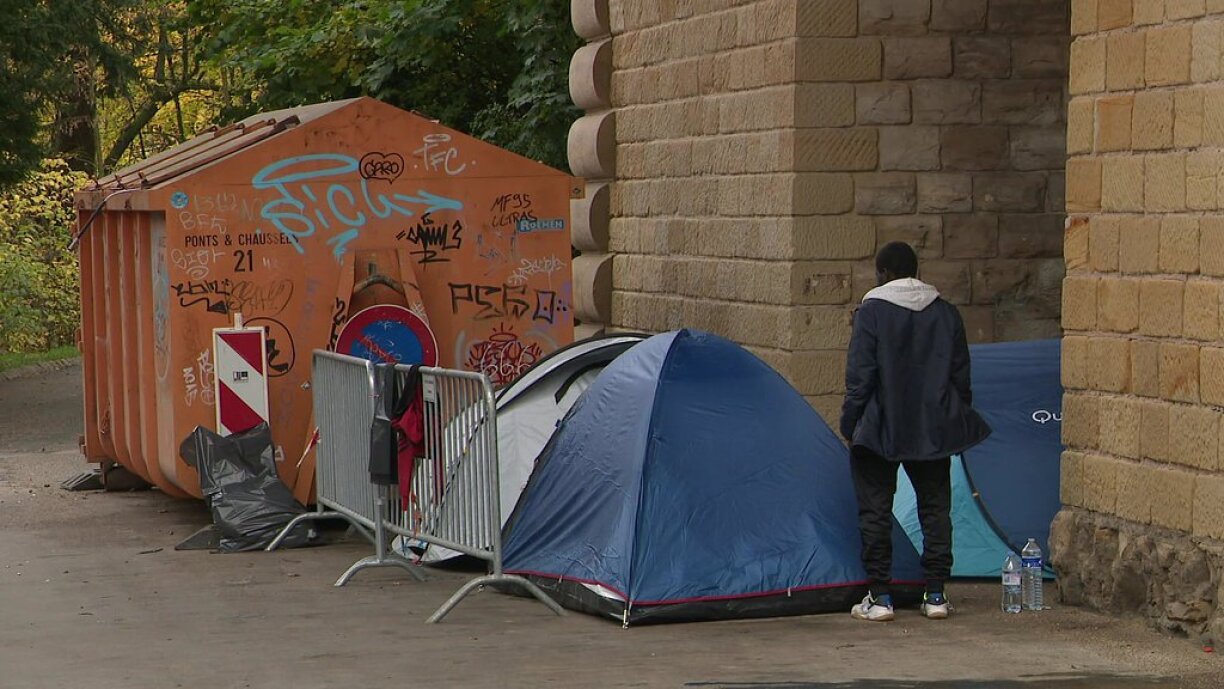
A new measure decided by the Minister of Immigration and Asylum, Jean Asselborn, to deal with the lack of accommodation capacity for asylum seekers has been causing controversy for a week. Under the new disposition, male refugees who are travelling alone and who have already applied for asylum in another European Union country under the Dublin regulations will no longer be accepted immediately at the Initial Reception Centre in Luxembourg City.
These individuals are then placed on a waiting list, with the result that they end up in a precarious situation on the streets since few of them feel held back by a waiting list after a journey of several years at the risk of their lives.
The Pont Adolphe in Luxembourg City on an autumn evening: while some are on a tram heading home, others have pitched their tents a few metres below.
On Monday, there were just two of them, but on Tuesday there were already six. It is an informal camp with no toilets or running water. Street workers came to pick up Mohamed, one of the ‘residents’, and take him to hospital. The cold of the last few days has taken its toll and the man is suffering from a high fever:
“It’s too cold. We’re sleeping in the street. I really don’t feel well. Really not well. It’s no longer 20 degrees. At the moment, unfortunately, we have no choice but to sleep in the street”, said Mohamed.
A number of organisations have donated tents and sleeping bags to the six men.
A temporary solution, because Mohamed and his companions are hoping for a warm bed after their tumultuous journeys: “In 2020, I was still in Guinea. Then I went to Algeria and Libya. Then I spent a total of four days in Tunisia. From there, I arrived in Italy. I lived there for a month. Then I arrived in Luxembourg via Switzerland and France. Luxembourg was my goal. I’ve known Luxembourg since I was a child. That’s why I absolutely wanted to come here. It was my big goal.”
Mohamed entered Europe via Italy, which is where he was registered. Under European rules, Italy is therefore responsible for his asylum procedure. However, the country is completely overwhelmed by applications and many refugees end up living in ghettos. So why not live in a tent in Luxembourg?
The Grand Duchy might see many more tents set up in the weeks and months to come. And it is going to be a cold winter.
For some, a thin piece of canvas over their heads is their only protection against the weather. Between August and September, almost 170 people arrived in Luxembourg and have not been given a bed in a facility, which means they are forced to live on the streets.
The country has learned few lessons from the great refugee crisis of 2014, criticises the Refugee Collective, which expects several dozen new refugees on the streets this winter.
“If we are forced to leave people out in the street, it is clear to us that our refugee policy in Luxembourg was a failure! There wasn’t enough foresight despite everyone knowing that the flow of people arriving was not going to stop all of a sudden. We knew there would be more people,” says Sergio Ferreira, a member of the Refugee Collective and the Association for the Support of Immigrant Workers (ASTI).
There are still major operational problems between the ministries, the National Reception Office (ONA), and the organisations on the ground.
The fact that the maximum bed capacity has almost been reached only adds fuel to the fire, according to Nonna Sehovic, also a member of the Refugee Collective and Caritas: “What worries us in particular is that this recent announcement was now made just before winter. And we know that emergency structures open throughout the winter, such as the Winter Action, are already overwhelmed at the moment.”
Even organisations like The Voice of the Street, which offers free lunch in the Gare district, are slowly but surely reaching their limits.
A spokesperson commented: “For a long time now, this has not been a simple question of the tasks of the ministries of foreign affairs and immigration. It’s a global issue to which it’s difficult to find solutions. But you have to realise that if ... you give them access to the labour market, you give them a few months to integrate, then that makes it easier for them to become independent.”
Early on Tuesday evening, Immigration Minister Jean Asselborn reacted to the statement published by the Refugee Collective on the Grand Duchy’s reception policy on 31 October. Despite their sharp increase, “accommodation capacities have reached their limits”, the Minister stressed.
Like other European countries, we have had to take measures, he elaborated, adding that “this change in the reception procedure and in obtaining accommodation has been put in place in order to give absolute priority to women, children and families, as well as the most vulnerable people.”
The measure has now been in place for a week. In the meantime, 53 men have been contacted by the social services. 17 of them have been given a bed. Two men who had been allocated a bed never turned up for the initial reception. 27 men are on the waiting list.
There are plans to open Hall 7 of the LuxExpo ahead of schedule, a few days before 1 December. 600 beds will be available there until the end of January. At the same time, according to Jean Asselborn, the ministry is trying to finalise the construction of other facilities, such as those in Schimpach.